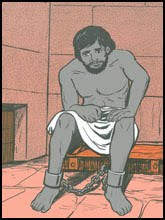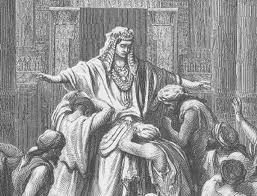7:1 God said to Moses, 'Observe! I will be making you like a god to Pharaoh, and your brother Aaron will be your prophet. 7:2 You must announce all that I order you to, and your brother Aaron will relate it to Pharaoh. He will then let the Israelites leave his land. 7:3 'I will make Pharaoh stubborn, and will thus have the opportunity to display many miraculous signs and wonders in Egypt. 7:4 This is why Pharaoh will not pay attention to you. But then I will display My power against Egypt, and with great acts of judgment, I will bring forth from Egypt My armies - My people, the Israelites. 7:5 When I display My power and bring the Israelites out from among them, Egypt will know that I am God.'
When studying a parashah, sometimes a single word propels me--other times it is a phrase or verse, perhaps a pericope. Once in a blue moon, however, it is the entirety of the parashah that moves me. Va'eira is such a portion.
Va'eira, meaning "I will reveal," reveals the dark side, not just of the oppressed mind of the rejecting Israelites, not just of the absolutely powered therefore absolutely corruptible Pharaoh, not just of the whimpering, no confidence Moses. Va’eira reveals the dark side of God. In this portion, God begins the terrible game with Pharaoh—making his heart stubborn so that God can display awesome and awful plagues. So many people will die, painfully and horrifically, but God will “have the opportunity to display many miraculous signs and wonders” so, who cares?
Va’eira is at the heart of the most oft told and well known story we have—the Exodus from Egypt—and yet Va’eira begins the darkest concept of God we have ever considered throughout our history. The God of Va’eira is bitter and bloodthirsty, opportunistic and sadistic. The God of Va’eira is as dark as the human soul can imagine.
I have always hated this imagining of God. Every time I read about God hardening Pharaoh’s heart, I get so angry; why is it alright to bring ten plagues that will massacre hundreds, if not thousands of people when Pharaoh would have relented after the first five less horrifically destructive plagues? Why would we write a vengeful, sadistic God at all? What inside of the human soul requires the divine to mirror the darkness embedded in each of our souls?
Because that is the base truth of Va’eira: the human soul is filled with darkness as well as light. We are bitter and bloodthirsty, opportunistic and sadistic. Like the Israelites we reject. Like Pharaoh we are corruptible. Like Moses we have no confidence. So, we assume, like God we are cruel and fame seeking and vengeful and horrific in every way. We are dark and we have within us the spark of God therefore God must be as dark as we.
Va’eira is not about God. It is about the human psyche—the darkness within us all. Va’eira elevates our darkness to a fantastical, appalling, miraculous saga.
Do not get me wrong, I truly believe that we are amazing. The human experience is inherently good and beautiful and filled with wonder. Nevertheless, part of what makes us so outstanding is the fact that the darkness is always trying to engulf us. We live a life straddled between the yetzer hatov and the yetzer hara. Va’eira is yet another reminder that the ra is just as integral to the human experience as the tov. So integral, in fact, we even project our yetzer hara onto God.
God is not actually cruel and hardening and sadistic. We are.





 In his drunken state, he then becomes the first flasher in recorded history, perhaps even the first masturbator of note. Most people have found alcohol to lower their inhibitions. Have enough wine, beer, scotch, whiskey, vodka (my personal favorite) and you, too, may find yourself "uncovering" your nakedness for all.
In his drunken state, he then becomes the first flasher in recorded history, perhaps even the first masturbator of note. Most people have found alcohol to lower their inhibitions. Have enough wine, beer, scotch, whiskey, vodka (my personal favorite) and you, too, may find yourself "uncovering" your nakedness for all. 